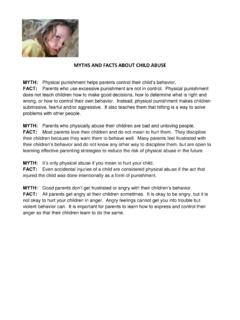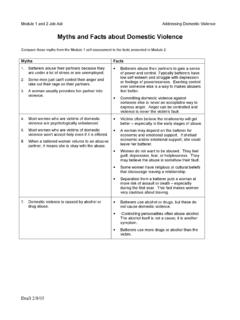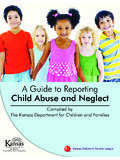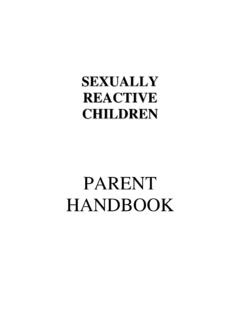Transcription of Mental Health Briefing Myths and Facts - …
1 Myths and Facts Regarding Mental Health Screening Programs and Psychiatric Drug Treatment for Children Karen R. Effrem, MD. Ed/Watch/EdAction / International Center for the Study of Psychiatry and psychology Alliance for Human Research Protection 763-458-7119. Myth: The President's New Freedom Commission on Mental Health is not advocating widespread Mental Health screening. The commission proposed broad screening only in settings where many children are known to have untreated behavioral problems. (Michael Hogan NFC chairman, Washington Times, 10/21/04). fact : The New Freedom Commission report frequently recommended universal Mental Health screening and treatment for children. ( ). For consumers of all ages, early detection, assessment, and linkage with treatment and supports can prevent Mental Health problems from compounding (p.)
2 19). Since children develop rapidly, delivering Mental Health services and supports early and swiftly is necessary to avoid permanent consequences and to ensure that children are ready for school. (p. 65). Screen for Mental disorders in primary Health care, across the life span, and connect to treatment and supports. (p. 65). Because of this important interplay between emotional Health and school success, schools must be partners in the Mental Health care of our children (p. 66). Myth: Informed parental consent is an important component of programs recommended by the NFC. fact : The NFC report never uses the word voluntary in the context of screening and treatment and uses the phrase parental consent just once to describe a program that uses passive, opt-out parental consent.
3 Parents at Penn and other schools could withhold their children from the screening by returning a form mailed to their houses. Parents who did not sign the form and return it were considered to have given permission for TeenScreen We would probably see the level of participation drop way off (if active consent were required),' he said. (Rumbach, South Bend Tribune, 1/19/2005). Myth: Psychiatric diagnostic criteria are scientificially validated and non-controversial among experts in the field. 1. fact : Mental Health diagnostic criteria are very vague and subjective. The very studies and reports cited by proponents of universal screening are full of contradictions. These experts admit the lack of science underlying psychiatric labels. In other words, what it means to be mentally healthy is subject to many different interpretations that are rooted in value judgments that may vary across cultures.
4 (Surgeon General Report on Mental Health . 1999. p. 1-5. ). The diagnosis of Mental disorders is often believed to be more difficult than diagnosis of somatic or general medical disorders since there is no definitive lesion, laboratory test or abnormality in brain tissue that can identify the illness. (Surgeon General, p. 2-18, ). No consistent structural, functional, or chemical neurological marker is found in children with the ADHD diagnosis as currently formulated. (Attention Deficit Hyperactivity Disorder State of the Science - Best Practices, Peter S. Jensen and James R. Cooper, Eds, Civic Research Institute, Kingston, 2000, p. 3-7). DSM-IV criteria remain a consensus without clear empirical data supporting the number of items required for the diagnosis.
5 Furthermore, the behavioral characteristics specified in DSM-IV, despite efforts to standardize them, remain subjective .. (American Psychiatric Association Committee on the Diagnostic and Statistical Manual (DSM IV- 1994), ). Myth: It is possible to accurately diagnose Mental illness in young children, even infants. Even before their first birthday, babies can suffer from clinical depression, traumatic stress disorder, and a variety of other Mental Health problems. (Florida Strategic Plan for Infant Mental Health ). fact : Due to rapid developmental changes, it is very difficult to accurately diagnose young children. Childhood and adolescence being developmental phases, it is difficult to draw clear boundaries between phenomena that are part of normal development and others that are abnormal.
6 (World Health Organization, World Health Report, 2001). The science is challenging because of the ongoing process of development. The normally developing child hardly stays the same long enough to make stable measurements. Adult criteria for illness can be difficult to apply to children and adolescents, when the signs and symptoms of Mental disorders are often also the characteristics of normal development. (Surgeon General, 1999). 2. Myth: Children would never be labeled potentially violent or mentally based on their worldview or politics. fact : Federally funded school violence prevention programs do label children based on their beliefs. A federally funded study held that people of a particular political philosophy had hallmarks of Mental illness.
7 A school violence prevention program funded by the federal government called Early Warning, Timely Response lists intolerance for others and prejudicial attitudes as an early warning sign for violence and Mental instability, saying, All children have likes and dislikes. However, an intense prejudice toward others based on racial, ethnic, religious, language, gender, sexual orientation, ability, and physical appearance when coupled with other factors may lead to violent assaults against those who are perceived to be different. ( Department of Education - Early Warning, Timely Response Action Guide ). In August 2003, the National Institute of Mental Health and the National Science Foundation announced the results of their $ million taxpayer-funded study.
8 It stated, essentially, that traditionalists are mentally disturbed. Scholars from the Universities of Maryland, California at Berkeley, and Stanford had determined that social conservatives, in particular, suffer from Mental rigidity,' dogmatism,' and uncertainty avoidance,'. together with associated indicators for Mental illness.. (Eakman, Chronicles, 10/04. See full study at ). Myth: Mental Health screening instruments are scientifically validated and screening programs are effective at preventing suicide. fact : Screening instruments are not validated or effective and fail to prevent suicide. [TeenScreen has] reasonable specificity identifying students at risk for suicide. A. second-stage evaluation would be needed to reduce the burden of low As with other suicide risk instruments, the CSS has the potential of having high ( ).
9 Sensitivity at the expense of specificity [false positives] (Journal of the American Academy of Child & Adolescent Psychiatry, 2004, v. 42, 71-79). USPSTF found no evidence that screening for suicide risk reduces suicide attempts or mortality. There is limited evidence on the accuracy of screening tools to identify suicide risk in the primary care setting, including tools to identify those at high risk. (US. Preventative Services Task Force #clinical). Myth: Children are not adequately treated for Mental illness. fact : Children are over diagnosed and over treated with psychiatric medications and both problems will increase with wide spread screening programs. 300% increase in psychotropic drug use in 2-4 year old children between 1991-1995.
10 300% increase in psychotropic drug use in children between 1987 and 1996. More spent on psychiatric medications for children than on antibiotics or asthma medication in 2003. 3. Myth: The decision to treat a child with psychotropic medications is always between a parent and their physician. fact : Parent all over the country have been coerced with threats of child abuse or to place their children on or continue psychiatric medications prompting over 20 state legislatures and the US Congress to introduce or pass legislation prohibiting coercion. Both Matthew Smith and Shaina Dunkle died of medication toxicity after their parents were coerced to place their children on drugs by the schools. ( ). Paul Johnston was institutionalized with drug-induced psychosis after his parents were coerced to put him on 16 different psychiatric medications over seven years.




